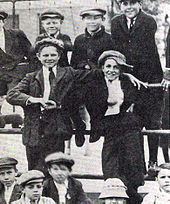 Dr. Seuss’s first book didn’t go so well. It was rejected by 27 publishers. Michael Jordan was cut from his high school basketball team. Walt Disney was fired. A local newspaper decided that he lacked creativity. This photo shows 10-year-old Disney (center right) at a gathering of Kansas City newsboys in 1912.
Dr. Seuss’s first book didn’t go so well. It was rejected by 27 publishers. Michael Jordan was cut from his high school basketball team. Walt Disney was fired. A local newspaper decided that he lacked creativity. This photo shows 10-year-old Disney (center right) at a gathering of Kansas City newsboys in 1912.
The film school at UCLA didn’t accept Steven Spielberg as a student. Abraham Lincoln failed miserably at politics, at least at first.
You get the point. The first word is not always the last word.
Thankfully, that simple truth is magnified in the Christian life. “It’s Friday, but Sunday’s comin’!”
We will pass through, and even under, our share of clouds and dark spots along the way … but the long-range forecast is San Diego sunny.

Romans 15:13 is a marvelous word of blessing from God’s Word: May the God of hope fill you with all joy and peace in believing, so that by the power of the Holy Spirit you may abound in hope!
The entrance of Jesus of Nazareth into the world brought joy (Luke 2:10) and peace (Luke 1:76-79), but also a real hope for all who call upon Christ’s name by faith. Joy and peace are the credentials of our heavenly citizenship, and hope is somehow connected to both. In the verse from Romans that we’re considering today, Paul mentions all three.
If you really want to know what difference it makes to be saved, think about your life without joy, peace, or hope. That’s a Friday without a Sunday.
Our hope comes from the Lord (Psalm 39:7), and specifically from knowing and trusting Christ (Romans 15:12; Ephesians 2:12). We understand that, factually, but it’s good to remind ourselves that we can’t create hope or produce hope on our own – since we’re generally so accustomed to thinking that we have to work hard to get what we need or want. Hope is a free gift, in a sense, because it stems from our grace-relationship with Jesus. Hope simply can’t be manufactured, no matter how hard we may try.
But exactly what are we longing for, when we long for “hope” to abound?
Hope is a confidence in the unwavering goodness of God (Proverbs 13:12). Notice in our initial verse that Paul did not simply mention “peace,” but he mentioned “peace in believing.” There is an element of faith that is connected to joy, peace, and hope.
It’s difficult to think about faith without thinking about our need to wait on the Lord, so we might want to consider that the hope we’re looking for might not be ours with lightning speed – but may in fact be the result of a growing love relationship with our Savior over a period of time (Romans 8:23-25). With a season or two of trials thrown in for that well-rounded Christian character that the Spirit is producing in us.
The English Baptist pastor John Gill (1697-1771) wrote of the kind of hope that only God can give. He taught that hope is produced in the human heart by the Holy Spirit. That the object of real hope is God – not any of the creature comforts that we might think we need in order to be hopeful.
Pastor Gill believed, and so do I, that hope is gospel-centered and gospel-saturated. As we grow in the knowledge of Christ’s love for us, and in awareness of His incessant faithfulness on our behalf, we become more and more hopeful – no matter what’s going on in the world or in our lives. Gill believed that trials enhance hope. I think he was right. Maybe not a particularly fun thought, but a great one nonetheless.
We never outgrow our need for hope. The good news is that Christ never stops providing it.
So go ahead and write that book that you’ve been meaning to write. Even if it “fails,” you didn’t. Because you’re standing on a Book that tells you who – and whose – you really are.

Leave a Reply